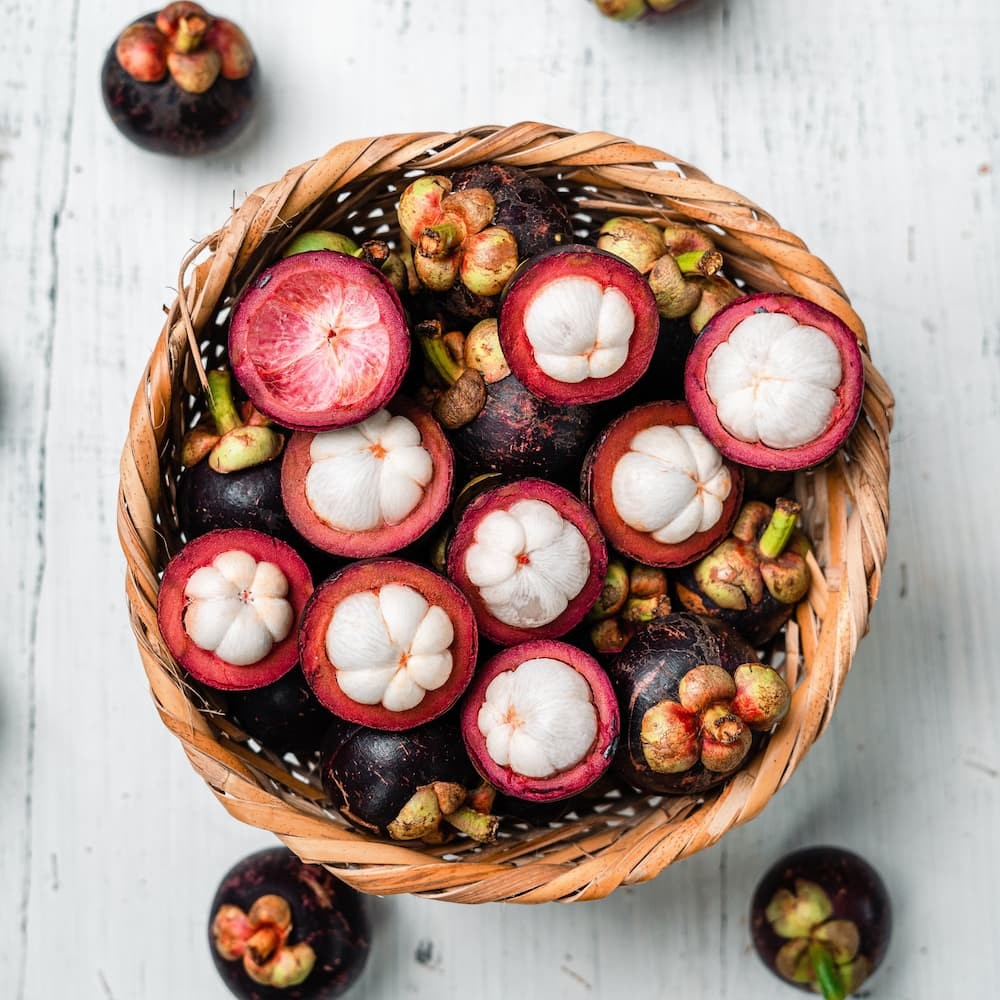
Mangosteen juice is made from the seeds, rind, and flesh of this tropical fruit which, together with the pomegranate and acai berry, is one of nature's super fruits. It typically has high nutrient and antioxidant qualities. Mangosteens contain xanthones, often referred to as super antioxidants, which are natural constituents of the flesh and rind of the mangosteen fruit. The mangosteen has by far the most xanthones of any plant, and is thought to be a more powerful antioxidant than Vitamin C.
Purple mangosteen (Garcinia mangostana) is a tropical fruit tree that is thought to have originated in Southeast Asia. It has a tangerine sized fruit with a dark purple rind, with sweet multi-segmented white flesh. To access the plum tasting flesh simply twist or press the fruit. The fruit pulp is used as a dessert but is also canned. It has since been cultivated more widely in the tropics, where it is a popular medicinal plant and folk remedy, particularly in the treatment of gastrointestinal disorders such as diarrhoea.
Mangosteen pericarp extract also has anti-inflammatory effects, hence used to treat infected wounds, tuberculosis, malaria, urinary tract infections, syphilis and gonorrhoea. In the Caribbean, a tea made from mangosteen is used as a tonic for fatigue, whilst Brazilians use a similar tea as a deworming agent and digestive aid. Because the plant takes many years to mature and produce fruit, sustainable harvesting techniques are essential to ensure over exploitation of this resource.
Is There Scientific Evidence to Support the Fruit's Health Benefits?
The antioxidant effects of mangosteen, such as lower blood pressure and normalized heart rate, have been reported by a number of people who consumed a juice blend containing high concentrations of the fruit. In addition, a 2013 study on the biological activities of mangosteen xanthones found that the compound reduced rat glioma cells through in-vitro digestion or injection, hence making it a potential treatment for brain tumours in human beings.
Furthermore, it has been found that a diet consisting of high concentrations of mangosteen is beneficial for intestinal digestion, as it supplies prebiotics to the body. As for the effects of mangosteen pericarp on symptoms of depression, specifically bipolar depression, mental health experts at Deakin University conducted a study in 2019 and found that the fresh fruit reduced mood symptoms and oxidative stress markers.
Although several clinical studies suggest that using high concentrations of mangosteen pericarp extract can help alleviate many physical and psychological problems, researchers are divided about the possibility of incorporating the fruit into traditional medicine for the treatment of chronic disease, but many believe it is highly feasible.
What's Good About It?
The known benefits of mangosteen have been appreciated widely, with more scientific research underway. This has centred on the significance xanthones play in fighting disease and degeneration. With over 30 xanthones occurring in the rind of the fruit alone, this bodes well for the future! Mangosteen may:
- Reduce cholesterol - mangosteen acts to reduce the 'bad' cholesterols in blood that cause blood clotting in arteries, without the side effects of conventional medications
- Acts to prevent heart disease - antioxidants act to protect against a hardening of the arteries (atherosclerosis), thereby reducing the risk of cardiovascular disease, heart attacks and strokes
- Support and enhance the body's immune system due to the high levels of antioxidants and vitamin C present in mangosteen extracts. Its high fibre content helps regulate gut bacteria, which reinforces the body's immune function.
- Help prevent cancer - studies have shown xanthones to be capable of killing cancer cells
- Increase energy levels - mangosteen contain high levels of potassium, which in the diet plays a vital role in cardiovascular health
- Act as a natural anti-inflammatory providing relief from joint pain and arthritis
- Alleviate gastrointestinal infections - xanthones have been shown to limit the growth of bacteria in the stomach
- Act as an astringent (substance that draws tissue together) - preventing dehydration and the loss of essential nutrients from the gastrointestinal tract of diarrhoea sufferers
- Help lower and regulate blood sugar levels in diabetes
- Provide some relief for sufferers of low level depression, such as bipolar disorder, as the mangosteen pericarp reduces oxidative stress and promotes regeneration of nervous tissues
- Reduce irritations of the skin such as eczema and dermatitis
- Helps prevent infections - as an antimicrobial and antiparasitic treatment
- Improve body weight as complementing a healthy diet with mangosteen supplements has been shown to lead to massive weight loss
It should be noted that the pasteurisation (partial sterilisation) process, used in many bottled drinks, may destroy the natural properties of fresh mangosteen. Food additives such as sodium benzoate and benzoic acid, aimed at preventing the liquid from deteriorating, may also alter the chemical nature of the fruit juice.
While a mangosteen-based juice blend is proven safe and healthy, and there is no current evidence that it causes adverse events, keep in mind that mangosteen juice alone is not a cure-all. It should be consumed as part of a balanced diet or as a dietary supplement. Consult your nutritionist or local health food outlet for further information about garcinia mangostana linn.
Originally published on Apr 11, 2009








